

Austin Next
Jason Scharf
Austin's evolution into a global innovation superstar is at the heart of Austin Next. We uncover insights into the region's transformation and what it means for ecosystem building.
Our exploration extends to emerging trends, technologies, and their convergence. Using Austin as our real-world case study and experts from around the world, we aim to understand the true nature and mechanics of innovation.
Our exploration extends to emerging trends, technologies, and their convergence. Using Austin as our real-world case study and experts from around the world, we aim to understand the true nature and mechanics of innovation.
Episodes
Mentioned books
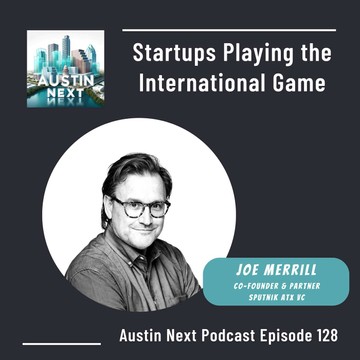
Jul 10, 2024 • 54min
Startups Playing the International Game with Joe Merrill, Co-Founder and Partner Sputnik VC
What do global trends affects on startups, the art of selling, startup accelerators, and the future lizard king all have in common? They are all just a few of the diverse and intersecting topics that I explore today with Joe Merrill, Co-Founder and Partner at Sputnik VC.Episode HighlightsSputnik ATX invests in pre-seed startups across various sectors, attracting companies from around the world, including Vietnam, Japan, and France, while focusing on "training nerds on how to sell." Austin is seen as a welcoming place for international startups due to its competitive marketplace and cultural acceptance, offering a less expensive and more supportive environment compared to Silicon Valley.Successful global sales demonstrate cultural flexibility, while understanding at the end of the day selling is still selling no matter what country you are in.Startups need to embrace adaptability by understanding how macro events affect them, leveraging international markets, and utilizing global talent pools to remain competitive and innovative What's Next Austin"I really feel strongly that the next great wave of technology is going to be coming from this state and Austin specifically leading that because this is where the rebels are. This is where the people are who want to just dramatically change the status quo and other places have become the status quo."Joe Merrill: Blog, LinkedIn, X/TwitterSputnik ATX VC: Website, LinkedIn, X/Twitter
-------------------Austin Next Links: Website, X/Twitter, YouTube, LinkedInEcosystem Metacognition Substack
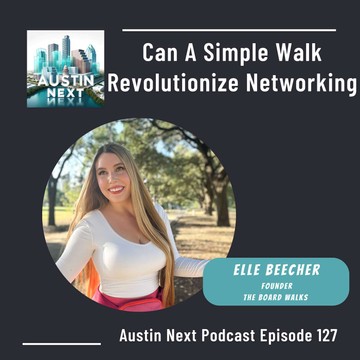
Jun 24, 2024 • 1h 1min
From the Archive: Can A Simple Walk Revolutionize Networking with Elle Beecher, Founder of The Board Walks
In honor of the The Board Walks' 100th walk this past weekend, we are rereleasing our episode with Board Walks Founder Elle Beecher.Episode Originally Aired September 12, 2023----------------------Fostering connectivity within an innovation ecosystem is crucial for its ongoing vitality and growth. Often revolutionary concepts emerge from the most unforeseen origins. My guest, Elle Beecher, founded The Board Walks, where community and innovation unite through a simple yet powerful concept—a five-mile walk. In this episode, we explore this social experiment, examine how these walks serve as catalysts for creative collisions, and bring back the intellectual dynamism of Paris in the ‘20s. Episode HighlightsDrawing inspiration from the 1920s Parisian cafe culture, Elle crafted The Board Walks to ignite creative collisions in Austin, offering a fresh, organic approach to networking.Curiosity stands at the heart of Elle's vision; she champions the idea that bringing together inquisitive minds sparks deeper, more meaningful dialogues.Though spontaneous in nature, The Board Walks are intentionally designed with playbooks and guidelines to foster genuine connections and fruitful discussions.Overheard dialogues during the walks resonate with Austin's innovative aura, reminiscent of Paul Graham's "eavesdropping quality" notion from his 2008 Cities essay.The walks serve as a platform for attendees to not only build professional relationships but also to delve into personal narratives and aspirations.Given its success in Austin, Elle envisions taking The Board Walks to other cities, like San Francisco, while ensuring the preservation of its foundational values and communal essence.What’s next Austin? “More creative collisions that will bring about Paris in the 20s energy.”“Cities and Ambition” by Paul GrahamElle Beecher: Website, LinkedIn, X/Twitter, InstagramThe Board Walks: Website, X/Twitter, Instagram
-------------------Austin Next Links: Website, X/Twitter, YouTube, LinkedInEcosystem Metacognition Substack
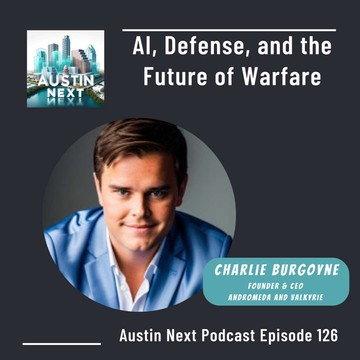
Jun 12, 2024 • 60min
AI, Defense, and the Future of Warfare with Charlie Burgoyne, Founder and CEO of Andromeda and Valkyrie
The future of defense and warfare has always been linked to technological change, from the discovery of fire to the Bronze Age to the Nuclear Age to now the AI Age. My guest today is Charlie Burgoyne, Founder and CEO of both Valkyrie and their newest spinout Andromeda, who joins me to discuss the future of warfare going forward. But we don't stop there as we explore every rabbit hole in search of Truth. Andromeda synthesizes large volumes of information quickly and accurately, helping users understand the interconnected context to make informed decisions.Pop culture and media narratives of innovation, from Terminator to Data to Her to Oppenheimer, shape how the public views, embraces, or fears technological waves.History has shown that industry and defense have always been intertwined, with modern tech entrepreneurs playing roles similar to industrialists of the past in advancing defense capabilities.Probabilistic thinking is essential in defense decision-making, especially where high levels of computation can easily mask high levels of uncertainties.What's Next Austin"I think that we're going to see a big push to support the intelligence community the way we've seen a big push to support the defense community. I think that an equivalent to AFC is coming on the intelligence side."Accountability in Age of LLMS at SXSW by Charlie BurgoyneValkyrie: Website, Facebook, InstagramAndromeda: Website
-------------------Austin Next Links: Website, X/Twitter, YouTube, LinkedInEcosystem Metacognition Substack
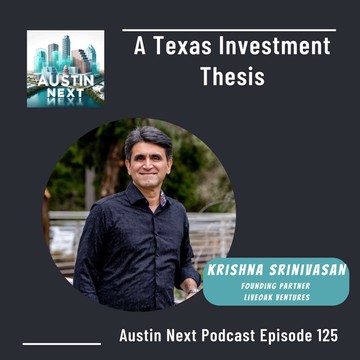
Jun 5, 2024 • 47min
A Texas Investment Thesis with Krishna Srinivasan, Founding Partner of LivOak Ventures
The only constant in Austin seems to be change. Whether that be the people moving here, the buildings defining our skyline, or the startups being founded and funded. Today, my guest is Krishna Srinivasan, founding Partner of LiveOak Ventures. We will explore what it means to invest in Texas startups yesterday, today, and tomorrow. Episode HighlightsThe need for early-stage venture capital in Texas led to the founding of LiveOak Ventures, which has a multi-segment approach focused on Texas-based entrepreneurs.Krishna identifies three types of founders now in Austin: experienced local entrepreneurs, successful founders from other markets relocating to Austin, and new residents inspired by the city's quality of life to start businesses here.Despite significant progress in startup formation and mid-level scaling, Austin faces gaps in experienced talent for managing large-scale, nine-figure+ companies and in securing substantial late stage venture capital.What's Next Austin?"Tremendous areas of promise and excitement where Austin takes all these newfound riches, when I say riches, newfound talent and with its traditional strengths and vertical markets to go to the next wave of and continuing this amazing wave of new company formation, growth, and scaling."Krishna Srinivasan: LinkedInLiveOak Ventures: Website, X/Twitter, LinkedIn
-------------------Austin Next Links: Website, X/Twitter, YouTube, LinkedInEcosystem Metacognition Substack
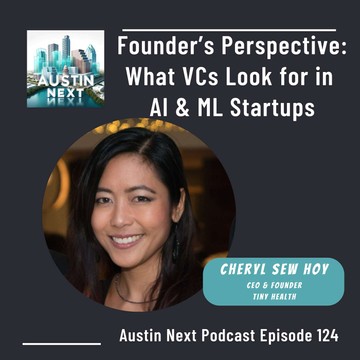
May 15, 2024 • 28min
Founder’s Perspective: What VCs Look for in AI & ML Startups with Cheryl Sew Hoy, CEO & Founder Tiny Health
In this episode, recorded at the Austin Data Science Salon, I sit down with Cheryl Sew Hoy, CEO and Founder of Tiny Health. Tiny Health is a pioneer in gut microbiome testing, providing critical health insights for moms and babies during the first 1,000 days. We dive into the current buzz around AI and machine learning, discussing the tailwinds and challenges founders face when raising venture capital. Cheryl shares her journey and insights, highlighting what VCs are looking for in today's dynamic environment.Cheryl Sew Hoy: X/Twitter, LinkedInTiny Health: Website, X/Twitter, LinkedInData Science Salon: Website, X/Twitter, LinkedIn
-------------------Austin Next Links: Website, X/Twitter, YouTube, LinkedInEcosystem Metacognition Substack
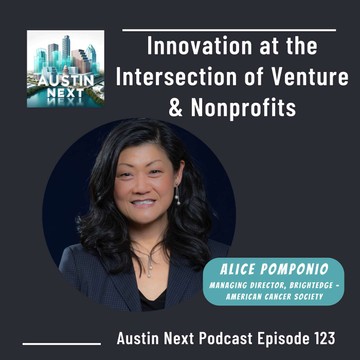
Apr 24, 2024 • 46min
Innovation at the Intersection of Venture and Nonprofits with Alice Pomponio, Managing Director BrightEdge - American Cancer Society
How does a nonprofit innovate and scale its mission? Joining me today is Alice Pomponio, Managing Director of BrightEdge, the venture arm of the American Cancer Society, to discuss the intersection of venture capital and nonprofit work. Is this approach a unique case, or part of a new wave of strategies catalyzing the defeat of cancer and other societal challenges?Episode HighlightsBrightEdge, the innovation and venture capital arm of the American Cancer Society (ACS), aims to bridge the gap between scientific discovery and practical application, creating a new funding source for the nonprofit.ACS has allocated over $5 billion to 25,000 researchers and 50 Nobel laureates, significantly influencing global cancer research.Capitalizing on the ACS’s extensive partnership network and volume of grants, BrightEdge enhances its deal flow and supports innovative cancer care solutions, ranging from therapeutics to care delivery.The newly announced Texas Accelerator by ACS highlights the strategic importance of the region in advancing national cancer research efforts, leveraging local capabilities, and enhancing ACS's impact through innovative cancer care approaches.What's Next?"Bright Edge is investing in innovation for impact. So we are really excited about reporting on our impact performance. We're excited about the accelerators taking flight and we're excited about building community"Alice Pomponio: LinkedIn, X/TwitterBrightEdge: Website, LinkedIn
-------------------Austin Next Links: Website, X/Twitter, YouTube, LinkedInEcosystem Metacognition Substack
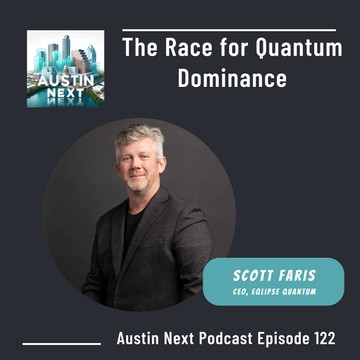
Apr 17, 2024 • 55min
The Race for Quantum Dominance with Scott Faris, CEO Eqlipse Quantum
I am diving back into the quantum realm where the stakes are high and the potential for innovation is even higher. Joining me is Scott Faris, a seasoned expert in the field, to unravel the complexities and opportunities of quantum technology. We explore how this revolutionary tech is shaping the future of global industries and national security, and why Austin is at the forefront of this next wave.Episode HighlightsAmidst escalating geopolitical tensions, the US, China, and other nations are racing to define the future, positioning quantum technology as a critical battleground where securing a first-mover advantage may determine long-term global dominance.Quantum technology leverages the principles of quantum mechanics to manipulate atomic and subatomic particles, unlocking new levels of precision.Even while quantum computing is still in development, quantum technology enhances capabilities in sensing, timing, and communications, setting new standards for accuracy and speed.Austin is poised as a key player in quantum technology, bolstered by its history with semiconductor manufacturing, a deep tech industry presence, and an ecosystem that efficiently supports scaling complex technologies.What's Next, Austin?"I think next Austin, everyone says this, everyone wants to be this. It is the epicenter of the technology industry in the United States in my view. It is what Silicon Valley once was and priced its way out of and politicized its way out of it. You need that as an economic engine for this country to be successful...Austin has all the right ingredients to exist at that scale. It's scale of creative, it's scale of industrial, it's scale of capital."Scott Faris: LinkedIn
-------------------Austin Next Links: Website, X/Twitter, YouTube, LinkedInEcosystem Metacognition Substack
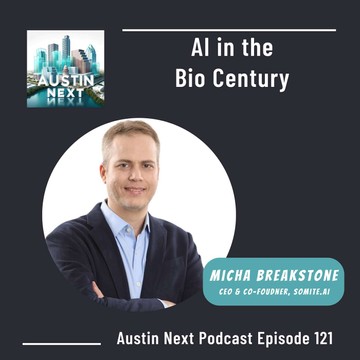
Apr 11, 2024 • 59min
AI in the Bio Century with Micha Breakstone, Founder and CEO of Somite.ai
As we enter the Bio Century, AI innovations are becoming pivotal in shaping the future of biology and medicine. In this episode, I am joined by Micha Breakstone, the founder and CEO of Somite.ai, who is at the forefront of integrating AI with stem cell biology. Together, we explore the intersection of AI and health, its history, and its impact on startups and enterprises alike.Episode HighlightsAI innovations are transforming biology and medicine, paving the way for revolutionary advances in disease understanding, diagnostics, and treatments.Somite.ai, aiming to be the OpenAI for stem cells, is developing a platform to map cell trajectories and guide pluripotent stem cells to become targeted cells for therapeutic use.AlphaFold's understanding of protein folding represented a major breakthrough, deepening our scientific understanding and serving as a clear example of AI’s potential impact on biology. The evolving landscape is creating tension between traditional asset-focused strategies and AI-driven platform business models, prompting questions about where the true value of these companies lies.What's Next, Austin?"I would absolutely love to see Austin become a force of nature in moving innovation forward."Micha Breakstone: LinkedIn, X/TwitterSomite.AI: Website, LinkedIn, X/Twitter
-------------------Austin Next Links: Website, X/Twitter, YouTube, LinkedInEcosystem Metacognition Substack
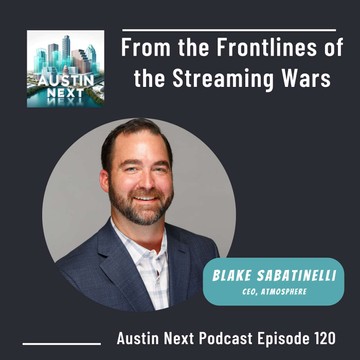
Apr 2, 2024 • 1h 5min
From the Frontlines of the Streaming Wars with Blake Sabatinelli, CEO of Atmosphere
In the midst of the streaming wars, a battle rages over the future of how we watch and interact with media. Joining me is Blake Sabatinelli, CEO of Atmosphere, to navigate the changes in consumer expectations, the future of the industry, and how Austin is quietly becoming a real player.Episode HighlightsAtmosphere is designed to enhance communal environments with curated content intended to replace muted TV, currently reaching 137 million people monthly across 65,000 businesses.The streaming industry is currently navigating an 'era of churn,' with likely consolidation ahead to enhance profitability and user experience, while Netflix remains well-positioned to thrive in this era through its expansive content library.Roku's move to Austin, the building of new of film studios, and companies like Atmosphere's innovating in the space exemplify the region's growth as a media hub, at the intersection of creativity and technological advancement. What's Next Austin?"I believe fundamentally that within the next 10 years, Austin will become a hub for creative use of AI. The companies that help drive it and the creatives that are around it, I think that will spur another revolution in this city."Blake Sabatinelli: LinkedIn, X/Twitter Atmosphere: Website, Instagram, Facebook, X/Twitter
-------------------Austin Next Links: Website, X/Twitter, YouTube, LinkedInEcosystem Metacognition Substack
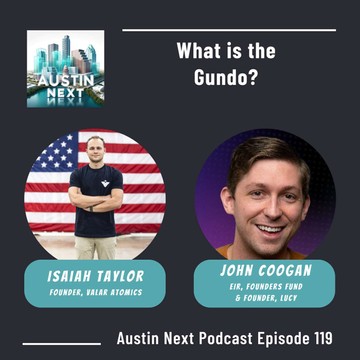
Mar 26, 2024 • 51min
What is the Gundo?
What makes innovation ecosystems thrive and can the learnings of one hub be applied to another? Today I am joined by Isaiah Taylor, a founder building in the Gundo, and John Coogan, who has done his own deep dive on the hub, to discuss all things Gundo. We explore its rise, what makes the region unique, its future, and the first principles that other hubs should be thinking about.Episode HighlightsStretching from Santa Monica to Long Beach and encompassing more than just El Segundo, the Gundo stands out as a broad hub for aerospace, defense, and hard tech, where a "small town Americana" vibe thrives.The Gundo attracts companies and individuals focused on solving complex challenges with atoms, not just bits, embodying a hardcore ethos that underscores a commitment to ambitious tech innovation.With its recent viral fame, the Gundo now faces the challenge of maintaining its innovation ethos amidst the pressures of increased visibility and expectations.Key lessons that can be brought to other regional ecosystems include the importance of not being apologetic about their core strengths and ambitions, coupled with the impactful role of strong personalities.What's Next?John Coogan "Startups were like in chaos...And in the midst of all that, there's like this small group of like five or so guys that are just like, we're going to go a very different direction. We're going to go off and do this thing. And, and it was like, so counter cultural that it, everyone just fell in love with it. Everyone just loves it online."Isaiah Taylor "I think what's next for the Gundo is we each have a company here has a lot of unbelievably ambitious things to pull off and we have to work extremely hard on it...here's a lot of people thinking about us the Gundo is the spot. And I think probably what's next for the the people who are here is making sure that people don't get overheated with it."Gundo Deep Dive by John CooganIsaiah Taylor: LinkedIn, X/Twitter, Valar Atomics, Why HydrocarbonsJohn Coogan: LinkedIn, X/Twitter, Website, YouTube
-------------------Austin Next Links: Website, X/Twitter, YouTube, LinkedInEcosystem Metacognition Substack


